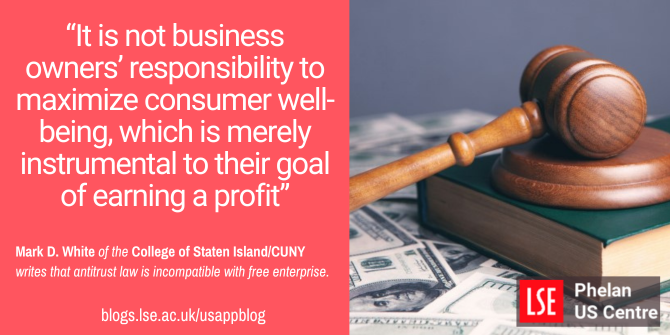 In the US and elsewhere, antitrust laws protect consumers from businesses forming monopolies and punish anti-competitive practices. Mark D. White writes that antitrust laws have the aim of maximizing people’s economic well-being, which implies that businesses exist to improve society’s welfare, rather than to benefit their owners. He argues that antitrust laws are not compatible with property rights and economic liberty, as they sacrifice the rights of some – business owners – in favor of the well-being of consumers.
In the US and elsewhere, antitrust laws protect consumers from businesses forming monopolies and punish anti-competitive practices. Mark D. White writes that antitrust laws have the aim of maximizing people’s economic well-being, which implies that businesses exist to improve society’s welfare, rather than to benefit their owners. He argues that antitrust laws are not compatible with property rights and economic liberty, as they sacrifice the rights of some – business owners – in favor of the well-being of consumers.
When we think of the market economy, we envision businesses and consumers coming together to buy and sell goods and services within the limits set by government and defined by the basic rights of all. If those rights are violated, by fraud, deceit, or sabotage, the violators are rightly punished under the law. Businesses must also obey regulations that govern the treatment of workers, product safety, and environmental practices, all justified—not uncontroversially, of course—in terms of the established rights of those affected. Generally, any interference with the exercise of property rights in commercial exchange must be justified by the protection of other, equally important rights.
And then we have antitrust.
Justifications for antitrust policies
According to its supporters, antitrust – laws which prohibit mergers that lead to monopolies and business practices like price collusion – is meant to protect the interests of consumers, smaller competitors, and society from the abuse of market power on the part of large businesses. In other words, the justification of antitrust is based on a rough version of utilitarianism, the moral philosophy that focuses on generating the most benefit for the most people, as are government policies that are designed to boost gross domestic product or total income.

Photo by Sasun Bughdaryan on Unsplash
However, there is an important distinction to be made. In the case of fiscal or monetary policy, the government uses instruments such as interest rates and tax rates to increase economic well-being by promoting stable growth with low unemployment and inflation. Under antitrust law, the government holds private business owners responsible for the maximization of economic well-being in society, and any behavior that fails to do so can be prevented or punished. Antitrust penalizes business, not for doing wrong in terms of violating the rights of others, but simply for not doing enough good. This implies that businesses do not exist to further the interests of their owners, but rather are agents of the state, tools used to promote broader economic well-being.
This goes against the typical understanding of commerce in liberal democracies, in which business activity reflects the free expression of individuals’ interests. In a market economy, some individuals sell their labor, some lend their capital, and some exercise their entrepreneurial drive through starting or joining businesses. Workers and investors are not expected to set aside their own interests and make decisions in the interest of society, but under antitrust law business owners are. (To be sure, altruism is a noble attitude that should be encouraged, but it is not required as a matter of law.)
A common target of antitrust authorities is the horizontal merger, in which the owners of two competing businesses agree to combine them into one, presumably to improve their total profit through increased efficiencies and market share. Government may try to prevent this merger based on its predicted upward effect on prices, which would have a negative impact on consumers. But many other actions a business can take similarly affect consumers, such as raising prices, eliminating products, or shutting down completely. None of these actions are fraudulent, deceptive, or coercive, nor do they wrong consumers, who have no right to demand firms charge a certain price or offer certain products.
A merger is no different, other than involving two firms rather than one, and when mergers are blocked, it is the basic property rights of the business owners that are violated—and not in the interest of any valid rights on the part of consumers, but only because it would set back their interests. However, it is not business owners’ responsibility to maximize consumer well-being, which is merely instrumental to their goal of earning a profit. Indeed, it is the very purpose of rights, including rights of property and contract, to protect individual’s choices against such requirements, provided these choices do not violate the equally important rights of others.
Antitrust isn’t compatible with economic liberty.
Antitrust betrays our most basic understandings of property rights and economic liberty—not just those of libertarians or classical liberals, but of most people living in liberal democracies with market economies. One need not believe in absolute and inviolable property rights to agree that they should not be set aside simply when their exercise inconveniences others. Antitrust sacrifices the rights of some in favor of the well-being of others by neglecting what rights are meant to do: protect individuals from being forced to make choices in someone else’s interests.
Despite the consensus of academics, policymakers, and government leaders around the world, antitrust is anathema to free enterprise. They argue that antitrust protects competition, but they rely on a notion of competition that targets a specific outcome at the expense of the competitive process itself. The exercise of property rights should not be prevented or punished when it involves no violation of the rights of anyone else. The only violation of rights in antitrust cases is found in the enforcement of antitrust law itself.
- Please read our comments policy before commenting.
- Note: This article gives the views of the author, and not the position of USAPP – American Politics and Policy, nor the London School of Economics.
- Shortened URL for this post: https://wp.me/p3I2YF-dDd






